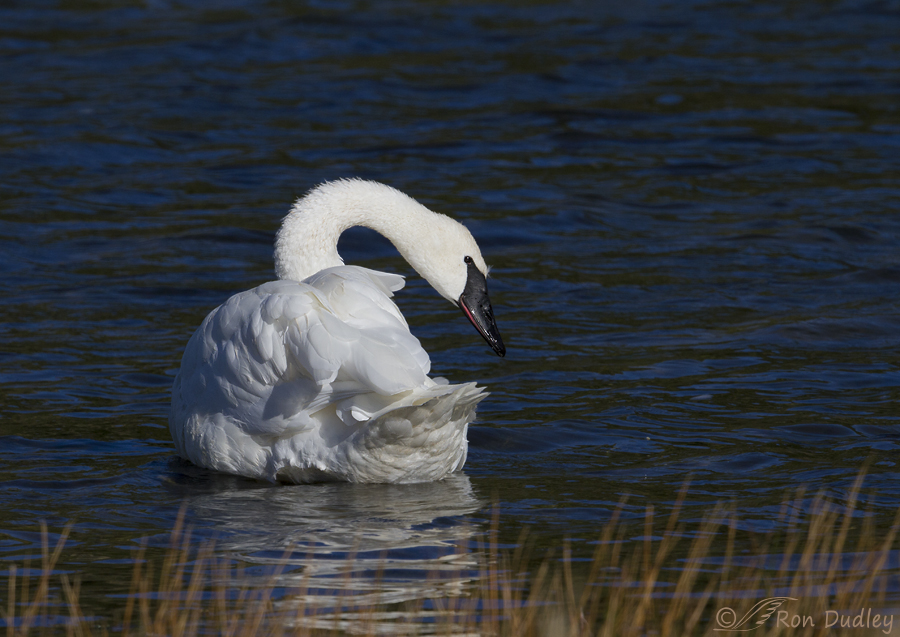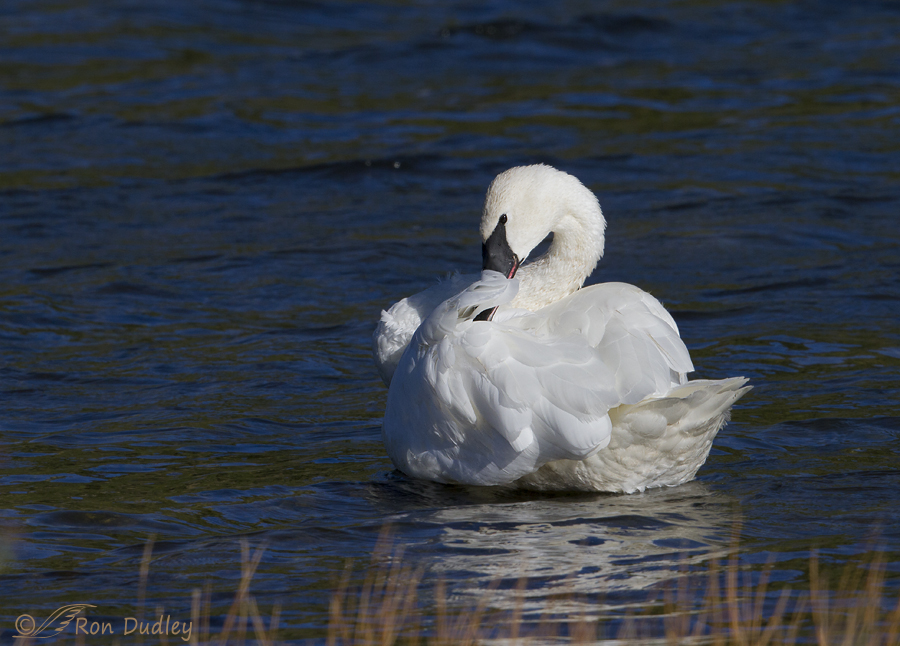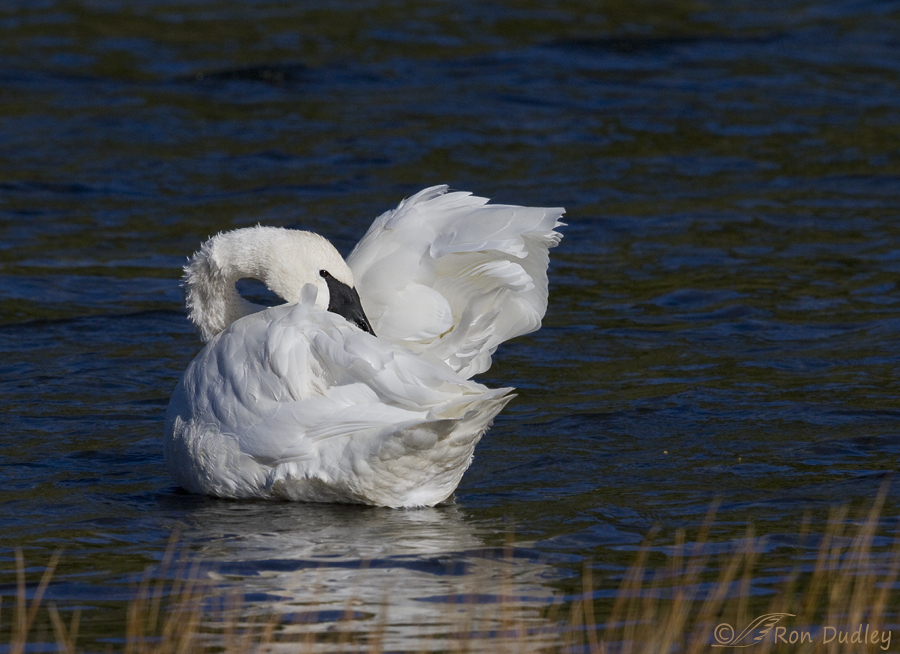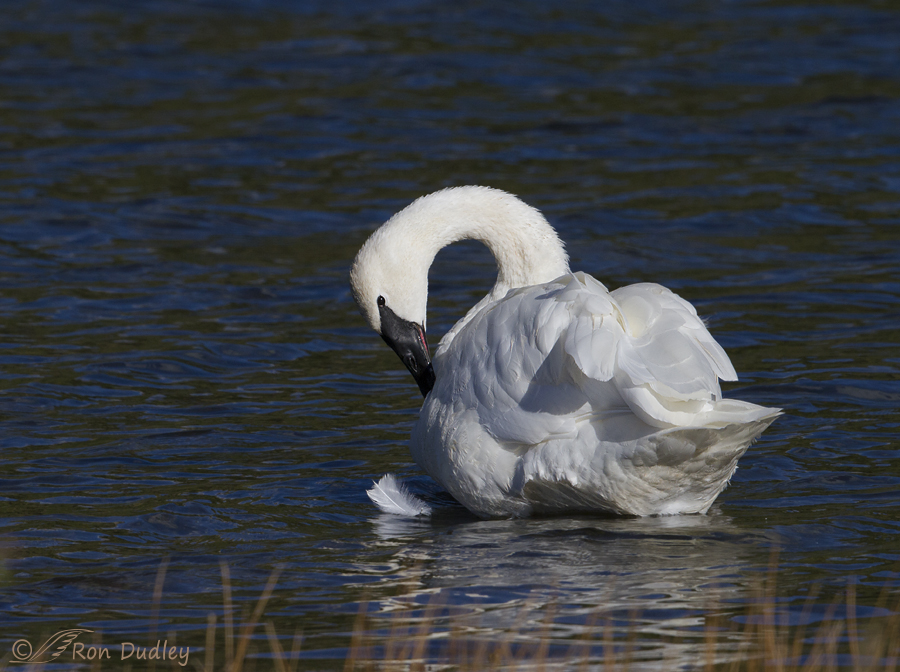At 32 lbs the Trumpeter Swan is North America’s largest native waterfowl and it’s 6 1/2 ft wingspan, bright white plumage and trumpet-like call make it a highly conspicuous bird. But by 1932, largely due to high demand for its skins and primary feathers, only 69 birds were known to exist and those known birds were found near Yellowstone National Park which led to the establishment of nearby Red Rock Lakes National Wildlife Refuge in 1935. Since that time their numbers have rebounded to about 46,000. I took these photos last week at Elk Lake which is adjacent to the refuge.
I often see a few of these magnificent birds on my visits to the Centennial Valley but due to their shy nature and efforts by the refuge to protect them from disturbance I rarely (as in never) get anywhere near them. But that changed late last Thursday afternoon.
1/1600, f/10, ISO 500, Canon 7D, Canon EF500mm f/4L IS II USM, not baited, set up or called in
As I approached the lake in my pickup I noticed a pair of swans at the edge of the water near the road and right next to an often-used camping area. Normally there wouldn’t be any swans anywhere near this busy spot but due to recent cold and blustery weather the camping area was deserted and I’m sure the shallow water at that end of the lake attracted the birds. As I stopped my pickup to observe the swans, both birds watched my vehicle carefully for about a minute and then began to preen.
They each had their backs to me the entire time and their bright white plumage against the dark water made for a very difficult exposure in the afternoon sun but I was still pleased with some of my images. Each of these photos is of the larger male and this bird, like many (though not all) adults, shows a salmon-red streak along the rear upper edge of the lower mandible.
1/2000, f/9, ISO 500, Canon 7D, Canon EF500mm f/4L IS II USM, not baited, set up or called in
I was almost mesmerized as I watched them use that tremendously long neck as a preening aid to easily reach every part of their body as they groomed. Their movements are slow and extremely graceful when compared to most other birds, even when they shake or “rouse”. In this image I like the wispy feathers wrapped over the top of his bill.
1/3200, f/9, ISO 500, Canon 7D, Canon EF500mm f/4L IS II USM, not baited, set up or called in
Here he’s preening under his wing and I like the pose despite the small feather sticking up in front of his right cheek.
1/2500, f/9, ISO 500, Canon 7D, Canon EF500mm f/4L IS II USM, not baited, set up or called in
At one point he plucked a feather from his flank, dropped it, and then watched it float away behind him as he continued to groom. The preening session lasted for 19 minutes and then both birds slowly swam out into deeper water to feed. As I look at these images I realize that they do not do justice to the tremendous size of these birds. They are huge!
I won’t soon forget being allowed so close to these wild, quintessential swans that came so very close to extinction.
Ron






Ron, I have seen trumpeters but never gotten close enough to see their feather detail. The sharpness of your images makes the birds come alive in my memory. Thanks
Absolutely gorgeous Ron. My favorite is the first picture, but they are all wonderful. Frame them for your wall!
Just gorgeous shots Ron!
Charlotte
How wonderful to hear of a (too rare) success story in bringing a species back from the edge of extinction. And better than wonderful to see them.
Thank you Ron. I would have been doing happy dances (at least metaphorically) if I had seen these stunners.
I love these intimate moments of preoccupied grooming, and would love to know what the swan was reflecting about as the feather floated away. Thanks so much, Ron.
Like ballet dancers stretching before a performance…Such big, beautiful,.gracefuli birds! Would be hard to pick a favorite, but second and last are partcularly appealing…like the loose feather in the last frame…You say the bird is watching the feather floated away…I think that bird is looking at its reflection and asking, “Who is that gorgeous creature.”…
Thank you for sharing the history and the beauty of these birds with us.
I’m glad you enjoyed the history along with the images, Karen.
Just beautiful!!!!
Thanks, Ellen.
Beyond beautiful!!
Thank you, Leisa.
Wow! The plumage is so perfect– making it a bit more clear why they were so prized.
We have a flock of trumpeters that stay the night next to our place once a year on their migration. Seeing them was amazing! To hear their truly trumpet-like call was rather amusing too- they are named quite aptly!
Thanks for the close up view- so beautiful!!
Suze, sometimes their feathers becomes stained and aren’t this white but these two birds were resplendent in their pure white plumage.
I really love swans too. They are beautiful birds. I love the story of the one watching the feather float away.
Arwen, I have several images as the feather floated away. The swan was clearly watching it even though it continued to preen as it did so.
Absolutely beautiful! I’ve always liked Swans, but have never been able to get close in the wild. How wonderful it is that they decided they could ignore you and go about their business. That was being kind to all of us who read your blog, as well as to you. I love the feathers in the second shot.
This is the first time I’ve ever been this close, Susan. It was very interesting to watch some of the intricacies of their behaviors from that distance.